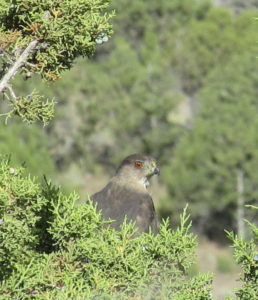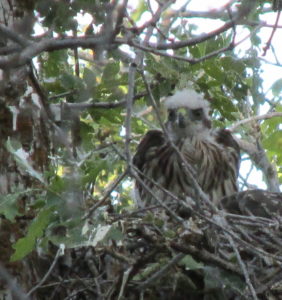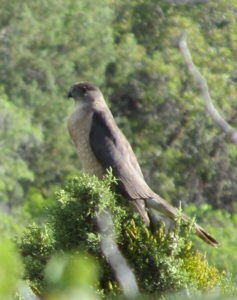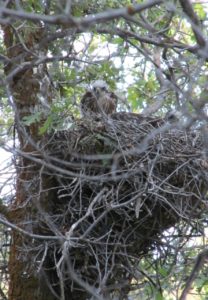In my twenties, I worked for two summers as a field researcher in Michigan and North Carolina. My job was studying Indigo Buntings, finding their nests, catching and banding the adults, as well as the young.
 Buntings like to nest in secondary growth – tall grass, brambles, prickly shrubs. Their nests are hard to find if you’re just using your eyes.
Buntings like to nest in secondary growth – tall grass, brambles, prickly shrubs. Their nests are hard to find if you’re just using your eyes.
But if you use your ears and knowledge of bird behavior, the job becomes much easier. Birds get upset when you’re near their nests. Depending on the species, they made chirp wildly, flit about, or get downright aggressive (Gulls will dive bomb and poop on you).
Paying attention to bird behavior is how I stumbled upon this fantastic Cooper’s hawk and her nest full of babies. I noticed her because of the cacophony of smaller birds, upset by her presence. She was perched above the trail, examining me, and did not take flight as raptors usually do. That was the tip off.
I looked around. Deep in the scrub oak, twenty feet off the ground, sat her nest. A nestling looked back at me, then another.
I was reminded again that the key to winning the wilderness lottery (seeing stuff, having cool moments) means following the ‘Can’t win if you don’t play’ mantra. It’s directly proportional to the amount of time you spend out there and the attention you bring to it.
Follow our weekly updates to appreciate the outstanding opportunities for wildlife spotting ‘round these parts! Sign up for our newsletter.
Mammals:
Black Tailed Jackrabbit
Cottontail Rabbit
Mule Deer
Coyote
Rock Squirrel
Yellow bellied Marmot
Birds:
House finch
Black Capped Chickadee
Goldfinch
Bushtit
Red-Tailed Hawk
Common Raven
Scrub Jay
Magpie
Turkey
Dark-Eyed Junco
Rock Dove
Catbird
Red winged Blackbird
Western Kingbird
Lesser Goldfinch
Mountain Bluebird
Meadowlark
Rufous-sided Towhee
Broad Tailed Hummingbird
Rufous Hummingbird
Chipping sparrow
California Quail
House wren
American Kestrel
Turkey Vulture
Common Poor Will
Common Nighthawk
Great Horned Owl
Killdeer
Starling
American Robin
Cooper’s Hawk


